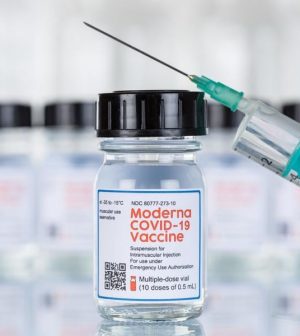- Could Your Grocery Store Meat Be Causing Recurring UTIs?
- Are You Making This Expensive Thermostat Error This Winter?
- Recognizing the Signs of Hypothyroidism
- 10 Strategies to Overcome Insomnia
- Could Artificial Sweeteners Be Aging the Brain Faster?
- Techniques for Soothing Your Nervous System
- Does the Water in Your House Smell Funny? Here’s Why
- Can a Daily Dose of Apple Cider Vinegar Actually Aid Weight Loss?
- 6 Health Beverages That Can Actually Spike Your Blood Sugar
- Treatment Options for Social Anxiety Disorder
COVID Vaccine Mistrust Levels Aren’t Budging, Study Finds

More than a third of Americans continue to express mistrust in the science behind COVID vaccines, a new study finds.
This level of mistrust has remained relatively consistent, expressed by 36% of people in 2021, 33% in 2022 and 36% in 2023.
People who lost a family member or close friend to COVID were significantly more likely to trust vaccine science and accept vaccination, results showed.
For example, those who experienced a loss within the past year were nearly four times more likely to trust vaccine experts, compared to those who didn’t lose someone, researchers found.
“Our findings underscore the critical role of trust in science during public health crises,” said lead researcher Trenton White, a postdoctoral fellow with the Barcelona Institute for Global Health. “The fact that personal experiences of loss due to COVID-19 was associated with trust levels highlights the need for public health communications to be sensitive to the emotional impact of the pandemic.”
Overall, vaccine acceptance tended to be higher in men, people with college degrees and higher-income families.
In the future, public health officials should consider the diverse backgrounds of the U.S. population and cater messages to effectively build and maintain trust in science, the researchers said.
“This research provides valuable insights for policymakers and health communicators as they continue to navigate the ongoing challenge of global vaccine hesitancy,” senior researcher Ayman El-Mohandes, dean of the CUNY Graduate School of Public Health and Health Policy, said in a CUNY news release.
The new study was published Nov. 2 in the journal Vaccine: X.
More information
The U.S. Centers for Disease Control and Prevention has more about COVID vaccines.
SOURCE: CUNY Graduate School of Public Health and Health Policy, news release, Nov. 4, 2024
Source: HealthDay
Copyright © 2026 HealthDay. All rights reserved.










